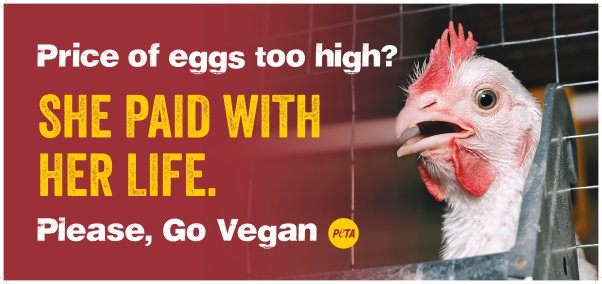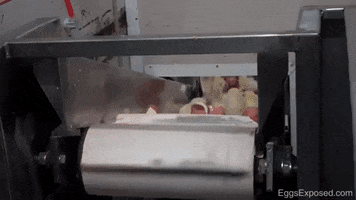5 Reasons Egg Shortages are a Good Thing
If the cost of eggs has increased too much for your budget … great! While many wonder why eggs are so expensive, PETA wonders why they haven’t cost more than a few dollars all along—especially since their production costs millions of chickens their lives every year and causes them immense and prolonged suffering throughout their short lives.

If you’re looking for a kind and affordable way to enjoy scrambles, omelets, and baking, we have all the best egg-free staples and facts you’ll need to know.
5 Reasons to Go Egg-Free
1. Chickens Are Killed at 2 Years Old in the Egg Industry
Chickens are arguably the most abused animals on the planet. In the U.S., nearly 400 million hens are used for their eggs. When they stop laying eggs daily, usually at about 1.5 years old, they’re deemed “worthless” by the industry and killed.
In the egg industry, more than 200 million day-old male chicks are ground up alive each year because they’re “useless” in terms of profit since they don’t produce eggs and aren’t large enough to be used for their flesh. This killing occurs as a result of the egg industry even if a company’s eggs are labeled “free-range” or “cage-free.” All eggs come from chickens born at hatcheries that kill day-old male chicks and raised on farms that exploit their mothers and sisters for their reproductive parts.

2. ‘Cage-Free,’ ‘Organic,’ and ‘Free-Range’ Eggs Are No Better for Chickens Forced to Lay Them
A PETA investigation into “free-range” egg company Nellie’s Free Range Eggs found thousands of hens crammed tightly together in a shed where each hen had only a little more than a single square foot of space. Chickens in sheds like these cannot properly extend their wings, stretch their necks for foraging activities, or roost for rest—and they cannot engage in any behavior, like foraging and dust-bathing, that make their lives fulfilling.
3. Animal Agriculture Causes Pandemics
Amid the largest bird flu outbreak in the country’s history, a highly contagious strain of the virus (H5N1) was detected in a human—a prison inmate working on a farm in Colorado—for the first time in the U.S. The worker was likely infected after helping to kill chickens en masse—a “disease control” measure that’s being implemented all over the country on farms where avian flu outbreaks have occurred. Outbreaks have been reported in chickens on commercial and “backyard farms” in at least 24 states.
In the U.S., farms may slaughter animals en masse for “disease control” by killing birds with a water-based foam, slowly smothering them to death (sometimes taking up to 14 minutes), and egg farms typically gas the birds to death. Others shut off all airflow in the sheds in another extremely cruel method known as “ventilation shutdown plus,” which involves raising the temperature to as high as 120 degrees and adding carbon dioxide—suffocating and baking the birds to death. The agonizing process can take hours, as the birds writhe, gasp, and desperately thrust themselves against the walls of the enclosure in an attempt to escape, before eventually succumbing to heatstroke and suffocation.
4. Eggs and Other Animal-Derived Products Are More Expensive Than Veggies
According to a University of Oxford study, cutting meat and dairy out of your diet can reduce food costs by 25%—and even more if you go vegan for life! You’ll see the savings largely in whole foods like fruits, vegetables, and beans, but meat-free options have also decreased in price in recent years.
5. Eggs Are So Expensive! Egg-Free Options Are Kind and Affordable
With so many egg replacements available for baking or preparing a dish that calls for eggs, there’s no reason to support the horrid egg industry. As the demand for compassionate, plant-based foods keeps growing, we’re seeing more egg-free products appear on the scene. Some of our favorites are Simply Eggless, VeganEgg, and Ener-G Egg Replacer, among many other egg-free options.
Help Protect Animals, the Planet, and Your Wallet: Go Vegan Today
Animals are unique individuals with their own wants and needs. The idea that humans are entitled to their bodies for items like eggs is an example of speciesism, the misguided belief that one species is more important than another.
If you’re ready to help end speciesism, cut costs, and save animals, take PETA’s 3-Week Vegan Challenge. After going vegan for three weeks, you’ll be a pro at finding vegan options at your favorite restaurants, eating vegan on a budget, and meeting all your nutritional needs.
For more up-to-minute updates, follow PETA’s BlueSky account or find us on Threads or X.

